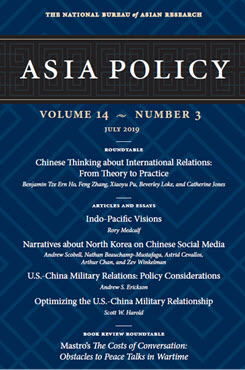U.S.-China Military-to-Military Relations
Policy Considerations in a Changing Environment
This article examines the National Defense Authorization Act (NDAA) and argues that it is both a relevant instrument of congressional oversight and an appropriate safeguard for U.S. policy in bilateral military relations with China.
Executive Summary
MAIN ARGUMENT
China’s rapid military modernization and increasing assertiveness under Xi Jinping—combined with growing tensions between China and the U.S.—have created a context for bilateral military relations that is significantly worse than in previous eras. This new reality makes it important to revisit the state of U.S.-China military relations with a critical eye. Initial findings suggest that the benefits of such contacts are real but limited, and in some respects they are asymmetric in favor of China’s military, with little prospect of major breakthroughs in favor of U.S., allied, or even shared bilateral interests. While a moderate degree of exchange is certainly better than little or no engagement, military relations cannot and will not improve the trajectory of U.S.-China relations. The NDAA is not preventing any activities in the U.S. interest that China would likely reciprocate fully. Transcending the current situation in bilateral military engagements without compromising U.S. interests does not require revisions of the NDAA or marginalization of congressional review, but rather demands progress in Sino-U.S. relations more broadly, which may be difficult under Xi.
POLICY IMPLICATIONS
- U.S. policy on military relations with China should proceed from a four-fold approach that is (1) clear and cogently communicated, (2) conditional and credible, (3) comprehensive, and (4) consistent.
- The U.S. approach should begin with a cautious Hippocratic oath of military engagement (“first, do no harm” to U.S. security interests), which puts the burden of proof on any advocates for changing the NDAA’s provisions.
- U.S. military relations with China should promote openness, transparency, and innovation in specific tangible areas, particularly those that help avoid incidents when their forces are in close proximity, such as risk avoidance, crisis communication, and deconfliction procedures, as well as those that provide public goods, such as humanitarian assistance and disaster relief.
- Finally, the U.S. military should emphasize equitable reciprocity and pursue a transactional approach that recognizes that progress can occur only to the extent that both sides are fully willing and able to work toward this end.
Andrew S. Erickson is a Professor of Strategy in the China Maritime Studies Institute at the U.S. Naval War College and a Visiting Scholar at Harvard University’s Fairbank Center.
About Asia Policy
Asia Policy is a peer-reviewed scholarly journal presenting policy-relevant academic research on the Asia-Pacific that draws clear and concise conclusions useful to today’s policymakers. Asia Policy is published quarterly in January, April, July, and October and accepts submissions on a rolling basis. Learn more


